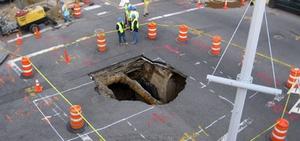InfrastructureFinal U.S. infrastructure report offers a sober message
In its fifth and final report on the state of U.S. infrastructure, the American Society of Civil Engineers (ASCE) has a sober message for elected officials, policy makers, businesses, and general public: unless the United States invests an additional $1.57 billion per year in infrastructure — drinking water and waste water, electricity, airports, seaports and waterways, and surface transportation — between now and 2020, the nation will lose $3.1 trillion in GNP (gross national product), $1.1 trillion in trade, a $3,100 per year drop in personal disposable income, $2.4 trillion in lost consumer spending, and a little over 3.1 million jobs.

ASCE: Failure to spend now means increased expense later // Source: columbia.edu
As a way of introducing the American Society of Civil Engineers’ (ASCE) 2013 Report Card for America’s Infrastructure, which will be released on 19 March, the ASCE, during a teleconference on 15 January, unveiled its fifth and final report in the Failure to Act series, The Impact of Current Infrastructure Investment on America’s Economic Future, which addresses the comprehensive impacts of underinvesting in infrastructure in the United States.
An ASCE release reports that ASCE has a sober message for elected officials, policy makers, businesses, and general public: unless the United States invests an additional $1.57 billion per year in infrastructure — drinking water and waste water, electricity, airports, seaports and waterways, and surface transportation — between now and 2020, the nation will lose $3.1 trillion in GNP (gross national product), $1.1 trillion in trade, a $3,100 per year drop in personal disposable income, $2.4 trillion in lost consumer spending, and a little over 3.1 million jobs.
“From transporting goods, powering factories, to heating and cooling office buildings, lighting theatres, to enjoying a glass of clean water, we depend on infrastructure as the physical framework for our economy and our quality of life,” said ASCE’s president, Gregory E. DiLoreto during the teleconference. “Our new report, Failure to Act, The Impact of Current Infrastructure Investment on America’s Economic Future, presents an overall picture of the economic opportunities associated with infrastructure investment and the cost of failing to fill the investment gap. This report answers the question: how does U.S. infrastructure systems, affect the nation’s economic performance.”
The report, which was produced by the Boston-based Economic Development Research Group, concludes that there will be an estimated investment gap between now and 2020 of $39 billion in airports, $16 billion in seaports and waterways, $846 billion in surface transportation, $107 billion in electricity, and $84 billion in drinking water and wastewater. It states in no uncertain terms that the deterioration of the nation’s infrastructure undermines the economy, jeopardizes public safety, threatens the quality of life, and harms the U.S. economy.
The release notes that , the Failure to Act series, the first known study of this nature and magnitude, examined the long-term effects of investment in infrastructure on the U.S. economy as a whole, presenting a picture of a very grave and rough road ahead, if America does change its present course.
“Each of our proceeding [Failure to Act] reports on various infrastructure sectors demonstrated a common theme: deteriorating infrastructure has a cascading impact on the nation’s economy, negatively effecting business productivity, gross domestic product, employment, personal income, and international competitiveness,” said DiLoreto. “The message is clear: if we do not invest now, all Americans end up paying more in the long run.”
“I think efforts like ASCE’s [Failure to Act] report, [ASCE’s] Report Card and ours, we have succeeded in raising the profile, because we hear that common talking point, that infrastructure is important to our economy, to jobs, and to [economic] growth, said Janet F. Kavinoky, the executive director of transportation and infrastructure and the vice president of Americans for Transportation Mobility for the U.S. Chamber of Commerce. “But now is the time to bridge the gap between recognizing the needs and willingness to act. The ASCE report cites large needs and the numbers can seem daunting, but they can be met if our elected and appointed officials are willing to show leadership and address revenue needs as soon as possible instead of waiting for the next infrastructure crisis.”
